John Groves
Operetta Research Center
18 December, 2020
One of the things that irritates me about Richard Traubner’s book Operetta: A Theatrical History is the way he dismisses works that he has clearly never seen or heard! For instance he describes the plot of Der Vetter aus Dingsda as “numbingly dumb (how could people have sat through it?), a clever producer might do it absolutely straight for added laughs. And many Lehár-lovers might find a collection of his (Künneke’s) love duets quite thrilling”.
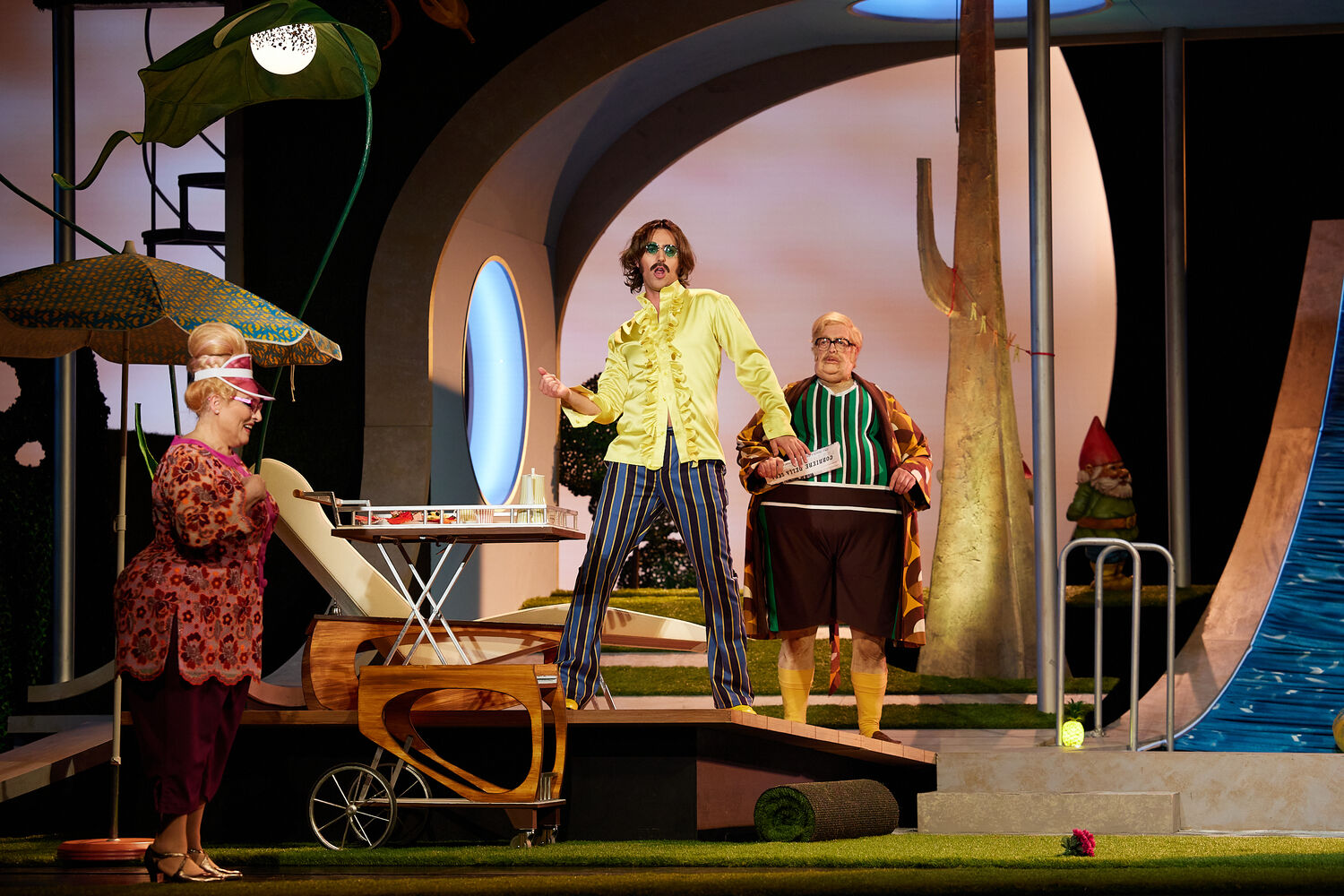
Maximilian Mayer as the tenor hero in “Vetter aus Dingsda” at Gärtnerplatztheater. (Photo: Christian POGO Zach)
In fact, the plot was charmingly whimsical when it arrived in London as The Cousin From Nowhere in 1923, inspiring musical comedies such as Vivien Ellis’ Mr. Cinders with its hit number “On the Amazon” influenced by Der Vetter’s biggest hit, the “Batavia Foxtrot”, and later such shows as Bless the Bride, Salad Days, Das Feuerwerk etc.
The small scale Vetter is an ideal show for a “socially distanced” production, needing, as it does, a cast of only nine and no chorus. And it was now put on by Gärtnerplatz Theater in Munich in a Sixties Barbarella-style production. Since the opening night had to be cancelled because of the new Corona lockdown in Germany, the company streamed the premiere. This stream will be available (for free) for the next three days.
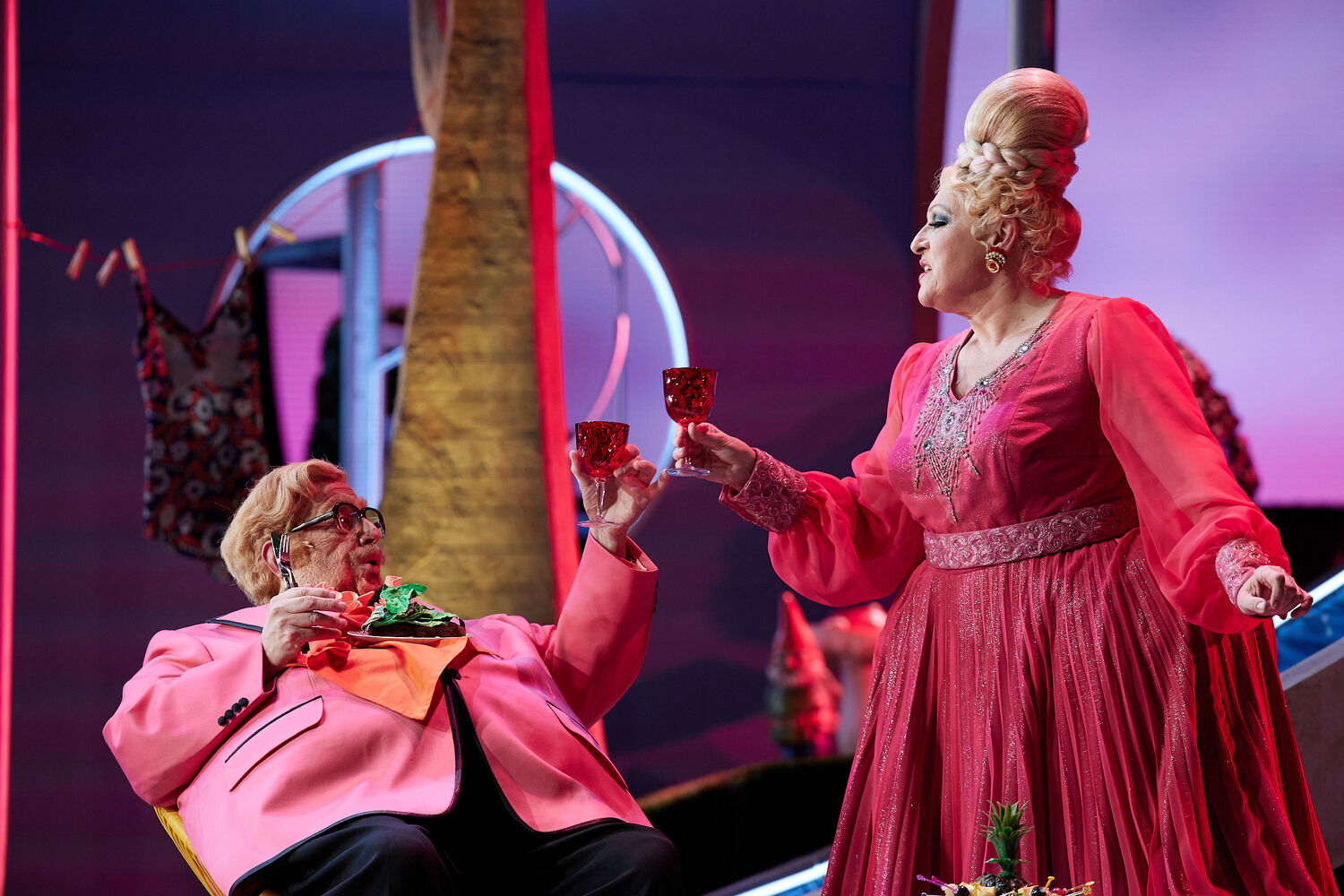
Erwin Windegger and Dagmar Hellberg as Uncle Josse and Aunt Wimpel in “Vetter aus Dingsda” at Gärtnerplatztheater. (Photo: Christian POGO Zach)
Julia, awaiting the return of her fiancé after many years apart, was energetically acted by Judith Spiesser, she was able to get the pathos into her singing for her “Song to the Moon” (“Strahlender Mond”), one of the many great melodies Künneke supplied. She was ably abetted by Julia Sturzlbaum as the effervescent friend Hannchen. Both ladies gave terrific energy to their scenes together, but the costume designer (Dagmar Morell) had put them both in 1960s mini-dresses and enormous backcombed wigs which had the effect of making them look older than they were supposed to be.
Julia’s relatives, Uncle Josse and Aunt Wimpel, forever eating and forever trying to exercise (with very little enthusiasm) were both padded out so that they were truly enormous: one of those jokes which may be amusing at first, but later becomes dull. Both Erwin Windegger and Dagmar Hellberg as Josse and Wimpel attempted to make the most of what the director asked them to do, but at times seemingly with little enthusiasm!
The chief ‘love interest’ in the operetta is the First Stranger, a role needing a tenor with ringing top notes as well as a baritone bottom register. Maximilian Mayer was very impressive in this role which he clearly relished, his tango with Julia being one of the many musical highlights of the evening. His rendering of “Ich biun nur ein armer Wandergesell” (those old enough may remember that the Irish tenor Cavan O’Connor used this as his theme song “I’m only a strolling vagabond… so goodnight pretty ladies, goodnight”) made a perfect romantic conclusion to Act One, and his Act Three aria was powerful.
The second ‘love interest’ Egon (Daniel Gutmann) is nothing like such a well-written role. We know that he is desperate for Julia’s hand in marriage by the ever-increasing size of the bouquets he brings for her, but the main purpose of this role is to enable the denouement in Act Three.
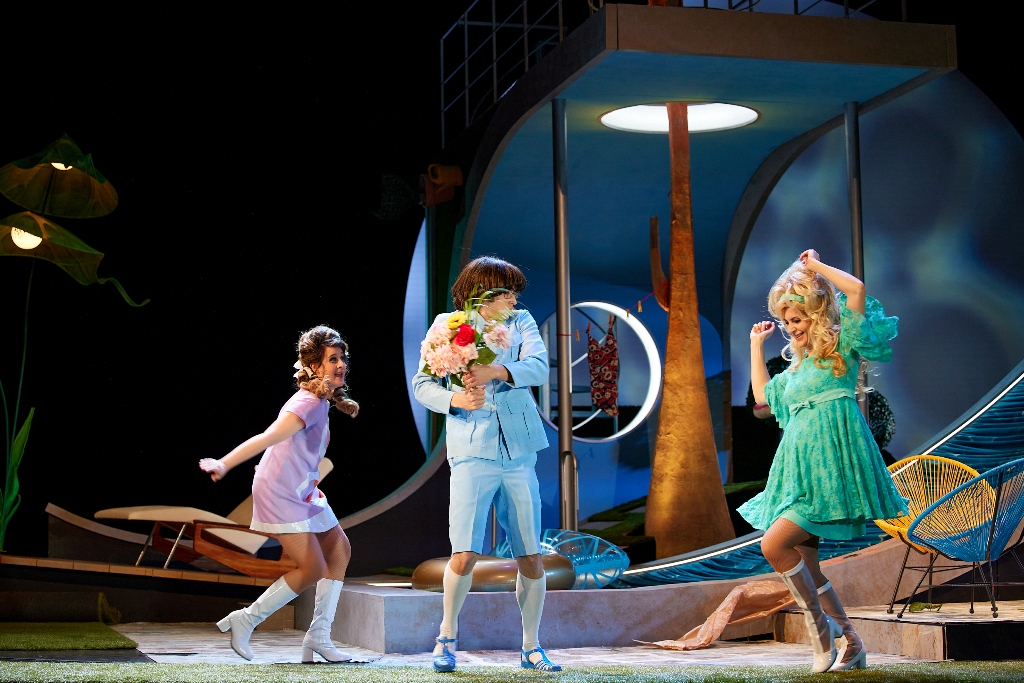
Daniel Gutmann (middle) with Julia Sturzlbaum and Judith Spießer in “Vetter aus Dingsda.” (Photo: Christian POGO Zach)
The third ‘love interest’ is the Second Stranger, and in fact the long awaited fiancé of Julia, who only appears in Act Three, but Stefan Bischoff was clearly determined to make the most of this role. The director (Lukas Wachernig) had him arriving crashing through the hedge in an American style car, but this entrance was too long/too cautious and dissipated the impact it could have made. But having arrived, he made the most of his dialogue and was most amusing. In fact, throughout the evening the direction of the dialogue was impressive, in my opinion, having energy and variety of pace, and usually leading well into the next musical number.
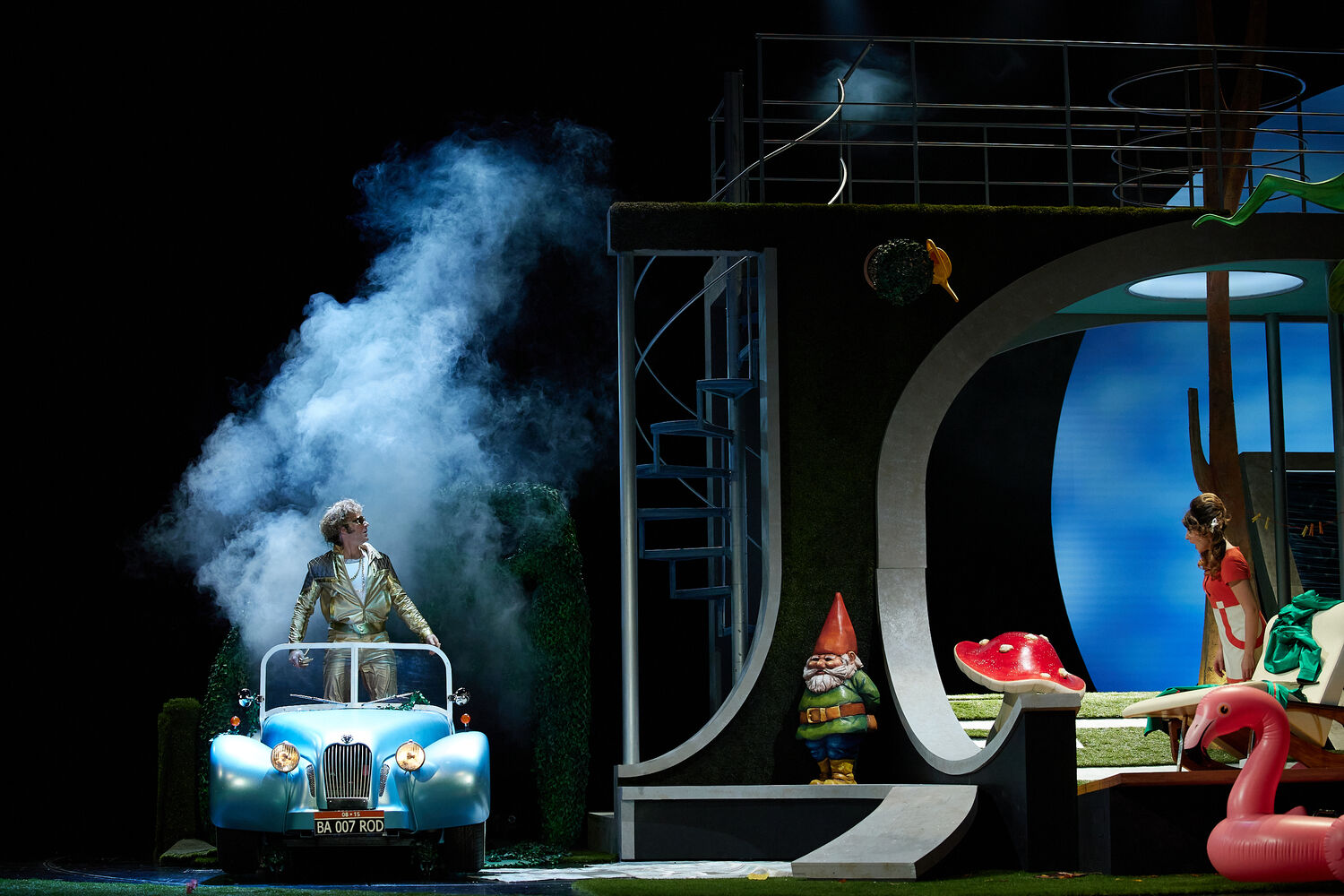
Stefan Bischoff arrives by car as the Second Stranger and meets Julia Sturzlbaum as Hannchen. (Photo: Christian POGO Zach)
Musical direction was by Andreas Kowalewitz, who reduced Künneke’s original orchestration for an even smaller number of players than usual so they could socially distance in the pit too. Occasionally, such as in “Oh Werter, Verehrter/Überleg dir’s vorher”, the orchestra did not have enough bounce, and the playing sounded too ‘careful’ (perhaps under-rehearsed?)
But the conductor’s handling of the “Batavia Foxtrot” was superb, just the right speed and mock gravity. Among the many tuneful numbers in this operetta, this must be the most instantly memorable. I have found myself thinking of it almost constantly in the eighteen or so hours since I saw this livestream, and I remember that the first time I saw it, about twelve years ago at Bremen, knowing nothing of it beforehand, it stayed in my mind for weeks, in the end only fading when I went to Bremen to see it again.
It is one of those numbers in a show that I need on endless repeat, especially when it is as inventively staged as it is in this new Munich production by the Tooting born British ballet/tap dancer Adam Cooper. Without giving too much away, his choreography relies on everyone being ‘high’ and works beautifully for me. One quickly forgets that Cooper has no chorus or corps de ballet to help in this climax to Act Two – luckily on livestream it is possible to watch it as many times as you like!
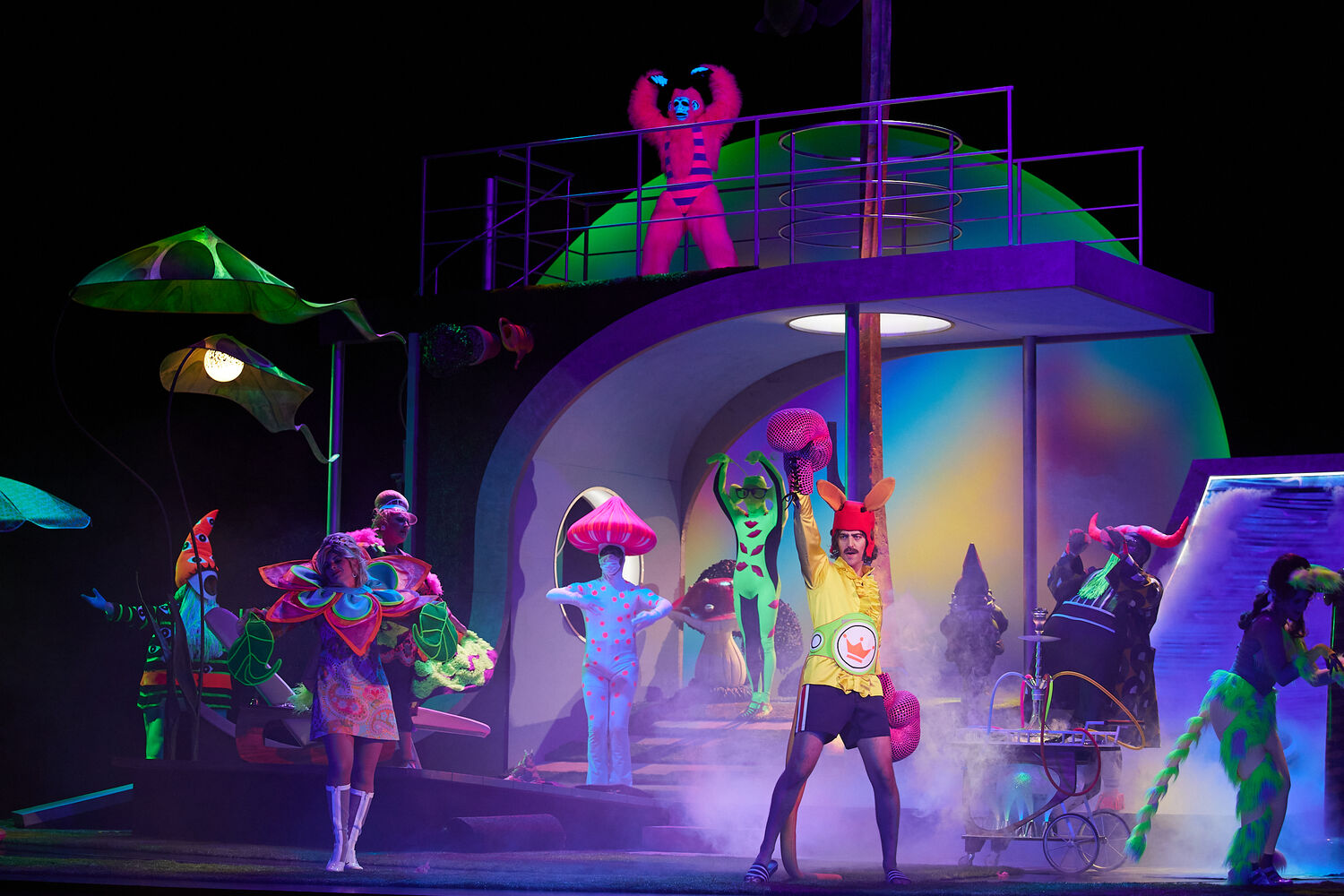
The “Batavia Foxtrot” scene from “Vetter aus Dingsda” at Gärtnerplatztheater. (Photo: Christian POGO Zach)
The ‘flower power’ single set, which is placed on a revolve, is cunningly designed (Judith Leikauf and Karl Fehringer) to include several areas on different levels where ‘private’ conversations can take place and include a non-horizontal swimming pool which is inventively used by the director and cast and adds to the ‘whimsy’ of the proceedings. In fact, what is most impressive about all the direction and design is the lightness of touch – this is pure froth it seems to say: just what is needed in these Covid times! As soon as anything appears that could be serious it is quickly swept away.
Although not perfect, I found this production totally delightful. Readers may have gathered that I love this operetta and if I were stranded on a desert island I should be content if I had a video or CD of the show (plus an endless supply of vodka and chocolate).
The Gärtnerplatz Theater deserves great credit for having the foresight and imagination to mount this production and then put the premiere on YouTube for all to access free of charge when all theatres were closed again.
The program booklet for Vetter aus Dingsda is available online, for free.
The filmed production will stay online until Sunday, 20 December, at 11 pm.Watch it below:
